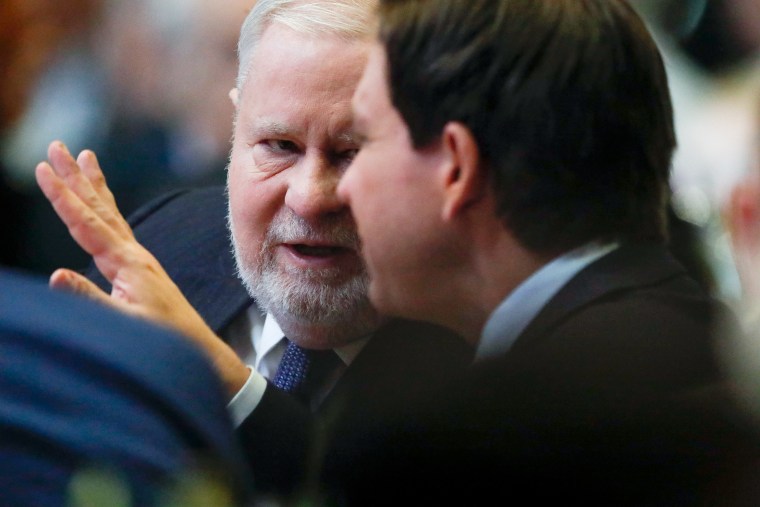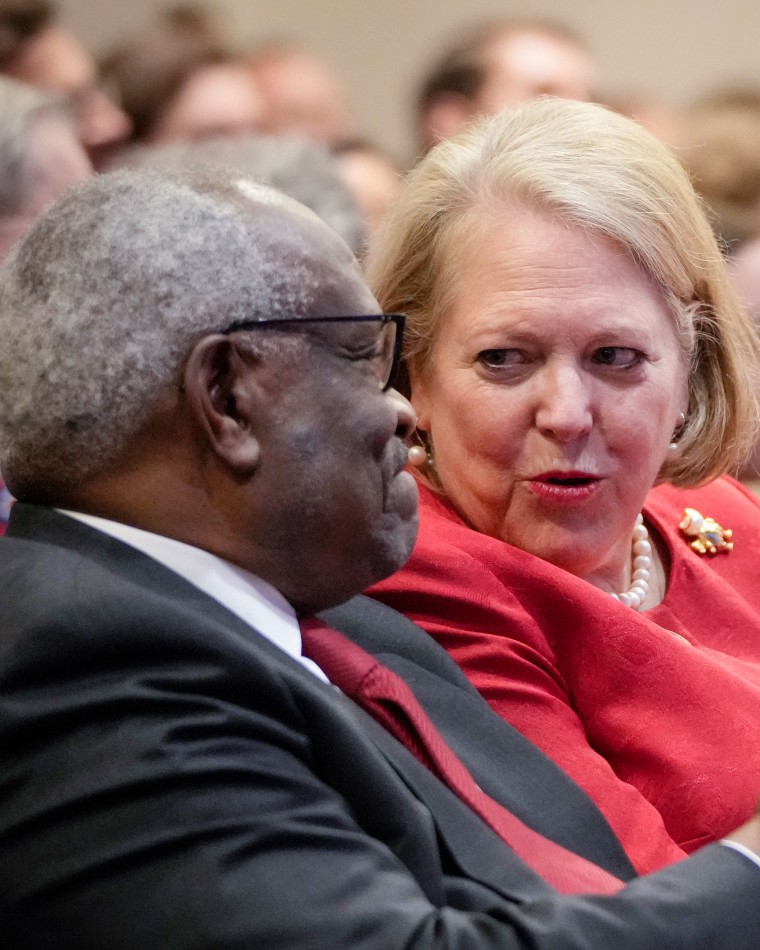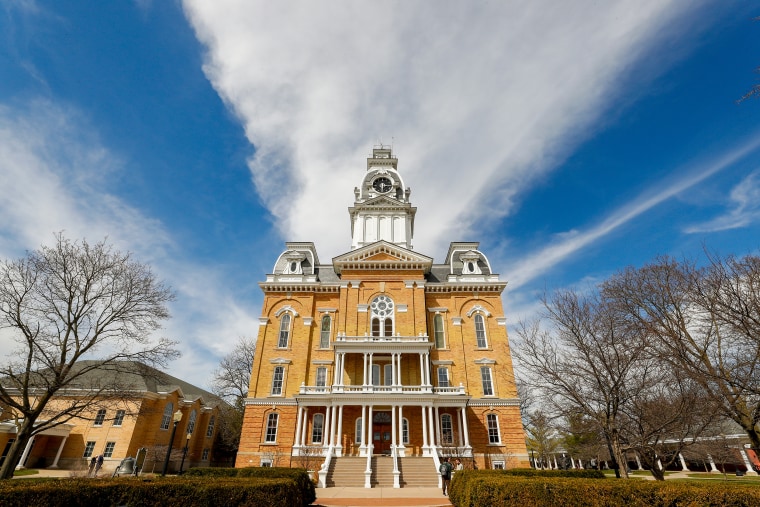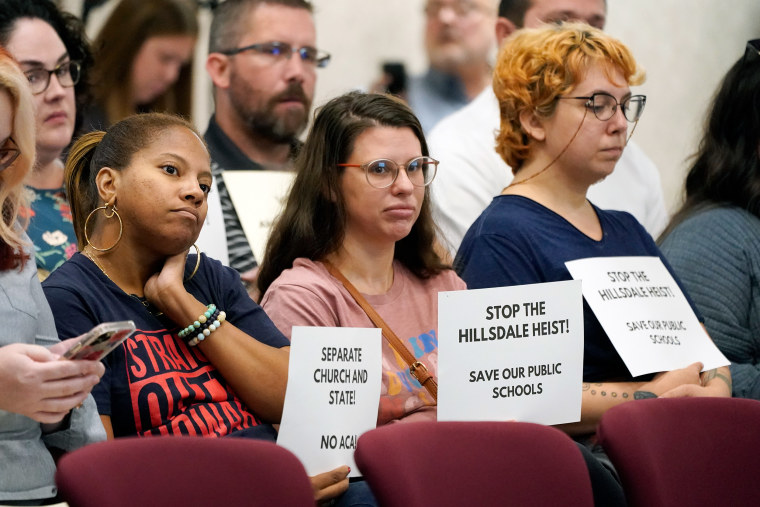For years, Hillsdale College was best known as a conservative Midwestern school that refused federal funding to avoid government regulations. The private Christian college’s Michigan campus features statues of Ronald Reagan and Margaret Thatcher and frequently hosts Republican politicians to give speeches.
Recently, though, Hillsdale has become more widely known as the go-to resource for conservatives looking to overhaul K-12 education. For some, the college’s name is shorthand for civics lessons that teach children to love America and reject the notion that racism still permeates society.
Amid national battles over what children should learn in public schools, Hillsdale is working to export this vision by setting up charter schools in over a dozen states and publicizing its 1776 Curriculum, which emphasizes American exceptionalism. The college says over 8,400 administrators and teachers have downloaded the curriculum, and a growing number of state and local policymakers are also seeking Hillsdale’s guidance.
In Pennsylvania, a school board in the Philadelphia suburbs recently hired a former Hillsdale administrator, over vociferous objections from teachers, to incorporate the 1776 Curriculum into the district’s coursework and advise administrators on books to remove from libraries.
In South Dakota, Gov. Kristi Noem, a Republican, brought in one of the college’s emeritus politics professors to set new state standards for a social studies curriculum based on Hillsdale’s models — as part of a broader order to eliminate critical race theory from schools. Supporters praised the new standards for rejecting “woke orthodoxy.”

And in Florida, Hillsdale faculty have been tapped to review school curricula and textbooks, lead teacher training sessions and govern a public college. Gov. Ron DeSantis, who is seeking the GOP presidential nomination, cited Hillsdale as he touted ways he’s overhauled education in the state during a speech last month at Moms for Liberty’s national summit.
Hillsdale, which has fewer than 1,700 students but a $900 million endowment, gives out many of its resources for free. The college’s leaders have said they’re getting involved in K-12 schools because they believe students should learn about the “very goodness” of America’s founding. Amid culture war battles dominating school districts, Hillsdale’s deep connections to the conservative movement have made it a trusted brand at top of mind for policymakers looking to reverse what they consider a progressive takeover of public education.
“What’s appealing about Hillsdale is that there’s an off-the-shelf answer,” said Jeffrey Henig, a political scientist at Columbia University’s Teachers College. “So legislators can express their outrage at what they think has been going on, and say, ‘Look here, we have the answer, and it’s a low-cost thing.’”
Matthew Spalding, Hillsdale’s vice president for Washington operations, said the college’s work on K-12 education is an extension of the school’s “extremely long view” on spreading the gospel of patriotism, and civil and religious freedom.
“Don’t think of us as a public policy institution or a political organization that kind of jumps in the fray here and there with the latest fad,” Spalding said.
In January, DeSantis named Spalding as a trustee to New College of Florida, and a top aide for the governor said the goal was to remake the public liberal arts school as a “Hillsdale of the South.” Spalding and four Hillsdale faculty were also picked by the Florida education department to give presentations in a civics training for teachers.
It’s rare for a college to provide so many resources for K-12 education, according to Chester Finn Jr., an assistant secretary of education in the Reagan administration, who holds positions at multiple right-leaning think tanks. And Hillsdale’s teaching model provides something that conservatives are seeking for their children, Finn said, “which is both here’s what they should learn, and let’s heal them from what they shouldn’t learn.”
As Hillsdale’s footprint has grown, so have protests over its influence. Educators and liberal-leaning parents object to Hillsdale’s curriculum, saying it inserts a right-wing worldview into K-12 schools. The American Historical Association has accused the 1776 Curriculum of downplaying racism, the Great Migration and the power of the Ku Klux Klan. (Hillsdale says its curriculum “comprehensively” covers “points of shame” in America’s history, mentioning slavery more than 3,300 times.)
“What they’ve done is they’ve simply left stuff out in an attempt to shape a vision of patriotism,” said James Grossman, executive director of the American Historical Association. “What they also are trying to do is replace an approach to teaching that teaches students how to think with an approach that teaches the students what to think.”
But Hillsdale’s critics have had little power to stop Republican officeholders intent on reshaping the way American history is taught.
“It’s the hat,” said Adam Laats, a historian at Binghamton University in New York who studies culture war battles over education. “The red hat that brought Trump to office — this idea that America can be made great again — I think the educational part of that is that if we’re going to make America great again, children need to love it. And they need to learn to love it, and we need to teach them to love it. And so the Hillsdale curriculum is the red hat in textbook form.”
Hillsdale’s emphasis on American exceptionalism, Laats said, appeals to people who “worry that if kids aren’t hearing that, they are doing things like running off and joining antifa and burning down cities.”

Hillsdale was founded by abolitionist Baptists in 1844 and was open to women and Black students from the start, facts that are frequently noted by college officials.
Hillsdale has spent years integrating itself in national conservative circles, notably through a Washington, D.C., satellite campus that Ginni Thomas, wife of Supreme Court Justice Clarence Thomas, helped establish in 2010. Former Education Secretary Betsy DeVos, well-known for her support of subsidizing private schools, is a major donor to Hillsdale. The conservative writer William F. Buckley bestowed much of his life’s work to the college.
Larry Arnn, co-founder of the Claremont Institute, a right-wing think tank, became Hillsdale’s president in 2000. Arnn serves on the board for the Heritage Foundation, a prominent conservative policy organization. Former Vice President Mike Pence and the right-wing activist Chris Rufo are among the college’s recent featured speakers. And the school’s alumni pepper the staffs of conservative media outlets and the offices of GOP officials.
In 2020, as conservatives protested The New York Times’ “1619 Project,” which highlights slavery’s role in shaping American history, then-President Donald Trump picked Arnn to lead a 1776 Commission. The commission produced a report that gave an overview of American history and principles. Historians knocked the report, saying it treated the country’s founders as “godlike men,” minimized women and people of color and compared 20th-century progressive reformers to Italian dictator Benito Mussolini.
“These are legitimate and serious questions — the role the progressive movement played, and how that changed our understanding of the American founding, is a crucial one and a very important one,” said Spalding, a Hillsdale dean who was also on the 1776 Commission. “And I think that a good history should go back and grapple with those questions.”

Six months after President Joe Biden dissolved the commission, Hillsdale released its 1776 Curriculum, a social studies resource for K-12 schools that claims “progressivism was a rejection of the principles of the Declaration of Independence,” and that the 20th-century Civil Rights Movement created “programs that ran counter to the lofty ideals of the Founders.”
“That’s a pretty political and distorted view of American history,” said Sean Wilentz, a Princeton history professor who also thought the “1619 Project” was a flawed historical presentation. “But they see history as politics by other means. That’s really the core of it.”
Spalding told a podcast put out by the Heritage Foundation, where he used to work, that as conservative parent groups launched protests against how schools discuss race, he saw “a chink in the armor here of the left.” Spalding said that Hillsdale wanted to “make it extremely easy” for parents and teachers to find an alternative to the “1619 Project,” which he called “so over the top.”
According to Kathleen O’Toole, who leads Hillsdale’s K-12 efforts and is Arnn’s daughter, the 1776 Curriculum evolved out of a plan to create an American history textbook that had been simmering for years.
“It’s really important that the regime that we are part of be a good one,” O’Toole said in an interview. “And it’s important in order to help make it a good one, that we look for opportunities in our past to be proud.”
Conservative school board members in the Pennridge School District, in Bucks County, Pennsylvania, contacted Hillsdale earlier this year because they wanted to use the 1776 Curriculum.
According to emails obtained through public records requests, Hillsdale connected the district with Jordan Adams, who was then the director of curriculum for the college but soon left to start his own education consultancy. In April, the conservative board members decided to hire Adams at $125 an hour to overhaul the district’s curriculum — the first district in the country to hire his consultancy. Board members have defended him as a “seasoned expert.”
Pennridge Superintendent David Bolton objected. In an email he sent the week Adams was hired, Bolton told the school board it seemed they were intent on implementing Hillsdale’s curriculum “regardless of what the staff thinks is best.” Bolton, who recently announced his resignation, did not respond to an interview request.
Parents and teachers have protested for weeks. At a June 20 meeting where Adams recommended that Pennridge teach more American history and pull books that discuss dark themes like drunk driving, sexual abuse and suicide, parents and teachers said it was important to address difficult subjects with students.
“It’s not meant to do any harm to students or exacerbate issues they may have,” Sarah Raber, a Pennridge curriculum supervisor, said at the meeting. “It’s to help students learn how to read, learn how to write and to understand that every day they come here they have resources and they are cared for by the people in their buildings.”
Adams, who declined interview requests, said in an email that he disagreed with the criticism. “Concerns over the impact of such content on children should not be underestimated,” he said, adding that “there are better alternatives.”

The South Dakota education department also hired Adams to lead sessions this summer at a summit to train teachers on the state’s new social studies standards, modeled on the 1776 Curriculum and adopted in April.
William Morrisey, an emeritus politics professor who retired from Hillsdale in 2015, received a $200,000 contract to lead the South Dakota committee that developed the standards. According to Samantha Walder, president of the South Dakota Association of Elementary Principals, who served on the committee drafting the standards, Adams created the initial draft. He told Walder that he based the standards on the existing Hillsdale curriculum with additions about South Dakota history, she said.
Adams and Morrisey declined to speak about their work on the South Dakota standards.
Native American tribes in the state objected that the standards minimized discussion of their histories, and portrayed them as “warlike” when they are mentioned. Teachers also criticized the standards for requiring young children to understand complex topics; for example, second graders must be able to describe the fall of the Roman empire as well as conflicts between Muslims and Christians.
“When we put out statements and asked for changes, really nothing was made, our voices were not heard,” said Walder, who was recently named the state’s elementary principal of the year. “After thousands of comments, over 90% of them were against the proposed standards.”

Meanwhile, in Tennessee, Republican Gov. Bill Lee has tried to court the college to open charter schools — which are publicly funded but privately run — that would use the 1776 Curriculum and receive training and public relations help as a Hillsdale member school. Hillsdale currently has 23 member schools in 14 states.
Lee’s proposed partnership with Hillsdale hit a snag last year when Nashville-based TV station WTVF reported that Arnn said people with education degrees “don’t have to know anything,” and that “teachers are trained in the dumbest parts of the dumbest colleges in the country.”
The Hillsdale-affiliated charter schools backed off attempting to open in Tennessee amid backlash to Arnn’s remarks, but returned to propose five campuses this year. While three were rejected by local school boards, Rutherford County approved one of them in April, against the recommendation of a district review committee that noted concerns about the proposed school’s relationship with Hillsdale and its political nature. More than twice as many community members wrote in opposition to the school as those who supported it.
O’Toole, who ran a Hillsdale-affiliated charter school in Texas before leading the college’s K-12 efforts, said the schools seek to avoid modern politics and attract families who “don’t want their kids in the middle of a political fight.” Hillsdale, she said, wants to help American schools “remember what we used to know in this country about tried and true curriculum.”
“We’re just going to keep doing what we’re doing,” she said.
اكتشاف المزيد من ينبوع المعرفة
اشترك للحصول على أحدث التدوينات المرسلة إلى بريدك الإلكتروني.
